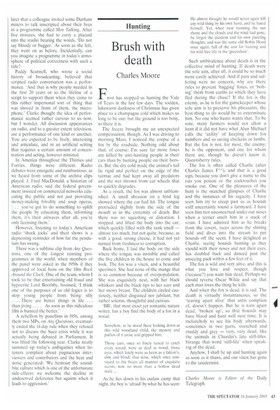Hunting
Brush with death
Charles Moore
Frost has stopped us hunting the Vale of Tears in the last few days. The sodden, lukewarm dankness of Christmas has given place to a champagne cold which makes us long to be out; but the ground is too bony, so there it is.
The freeze brought me an unexpected compensation, though. As I was driving to morning Mass, I noticed the corpse of a fox by the roadside. Nothing odd about that, of course: I'm sure far more foxes are killed by anti-hunting people in their cars than by hunting people on their horses. But the dry cold made the animal's tail lie rigid and perfect on the edge of the tarmac and had kept away all predators and the wet thrown from car wheels that so quickly degrades.
As a result, the fox was almost unblemished. A small abrasion on a hind leg showed where the car had hit. The tongue protruded slightly from the side of the mouth as in the extremity of death. But there was no squashing or distortion. I stopped, and lifted the body into the car, which quickly filled with the rank smell — almost too much, but not quite, because, as with a good, strong cheese, it had not yet turned from freshness to corruption.
Back home, I laid the body on the side where the tongue was invisible and called the five children in the house to come and look. The fox was a vixen, and a beautiful specimen. She had none of the mange that is so common because of overpopulation. She was exquisitely neat, with her black whiskers and the black tips to her ears and her snowy breast. The children circled cautiously, neither disgusted nor jubilant, but rather solemn, thoughtful and curious.
'BB', that most exact yet romantic nature writer, has a boy find the body of a fox in a wood:
Somehow, as he stood there looking down at this wild woodland child, the mystery and pathos of it arose and gripped him.
Those ears, once so finely tuned to catch every sound, were as deaf as wood; those eyes. which lately were as keen as a falcon's, dim and blind; that nose, which once conveyed to the brain all manner of exquisite scents, now no more than a hollow dead stalk ...
As he lies down in his outlaw camp that night, the boy is 'afraid' by what he has seen:
He almost thought he would never again kill any wild thing by his own hand, and he hated himself. Yet, when next morning the sun shone and the clouds and the wind had gone, he forgot the incident and his own puzzling thoughts, and was the same old Rollin Hood once again, full of the zest for hunting and his wild free life in the 'greenshaw'.
Such ambivalence about death is in the collective mind of hunting. If death were the sole aim, after all, it could be so much more easily achieved. And if pain and suffering were no concern, why are there rules to prevent 'bagging' foxes, or 'bolting' them from earths to which they have fled during the chase? If the fox is the enemy, as he is for the gamekeeper whose sole aim is to preserve his pheasants, the best thing to do would be to exterminate him. No one who hunts wants that. To be sure, many farmers would not allow a hunt if it did not have what Alun Michael calls the 'utility' of keeping down fox numbers and so saving chickens or lambs. But the fox is not, for most, the enemy; he is the opponent, and one for whom there are, though he doesn't know it, Queensberry rules.
The fox is often called Charlie (after Charles James F55), and that is a good sign, because you don't give a name to the rats you poison or the cockroaches you smoke out. One of the pleasures of the hunt is the snatched glimpses of Charlie and the instances of his sagacity. I have seen him try to creep past us as hounds sniff uncertainly round a farmyard. I have seen him trot unconcerned under our noses when a terrier smelt him in a stack of straw. I have admired him as he breaks from the covert, races across the shining field and dives into the stream to put hounds off the scent. I have delighted as Charlie, seeing hounds hunting as they should with their noses and not their eyes, has doubled back and danced past the unseeing pack within a few feet of it.
The fox is wild and very alive, and this is what you love and respect, though (because?) you want him dead, Perhaps we should reverse Oscar Wilde and say that each man loves the thing he kills.
And when the fox is dead, it is sad. The death is virtually instantaneous, so the 'tearing apart alive' that antis complain of, doesn't happen. But he is torn apart dead, 'broken up', so that hounds may have blood and hunt well next time. It is melancholy to see his body afterwards, sometimes in two parts, stretched and muddy and grey — very, very dead, like the animals in Chardin's late still-lifes. Strange that word 'still-life' when speaking of the dead.
Anyhow, I shall he up and hunting again as soon as it thaws, and our vixen has gone to the taxidermist.
Charles Moore is Editor of the Daily Telegraph.


























































 Previous page
Previous page